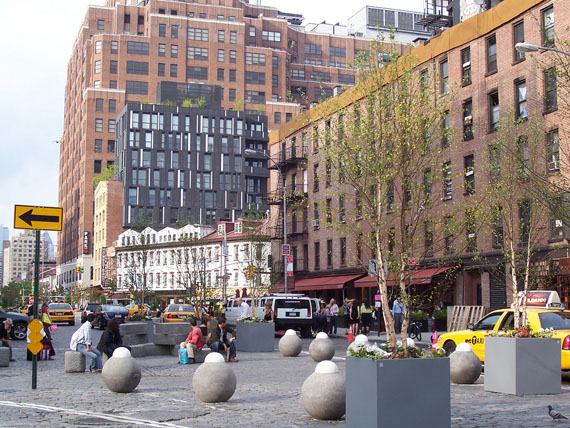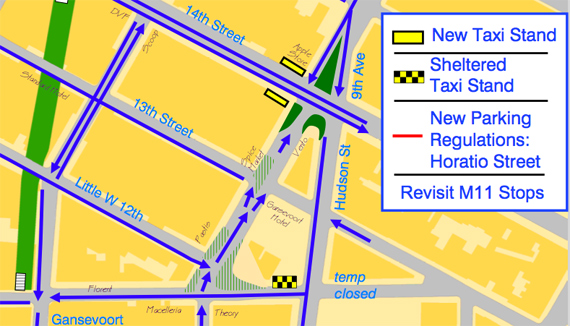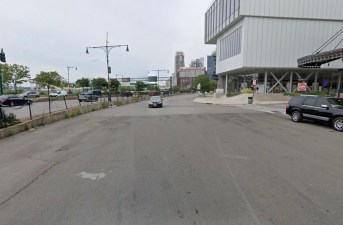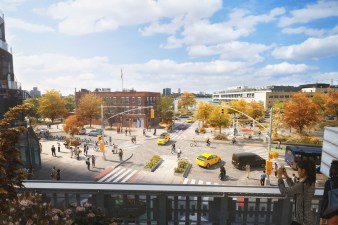The New Gansevoort: Pedestrian Godsend, Nightclubber Nuisance

A DOT team received a mix of gratitude and derision at Tuesday’s public forum about recent pedestrian improvements in the Meatpacking District, which attracted an audience of about 100 people to the Housing Works offices on West 13th Street. It was an interesting window onto the competing interests now vying to shape what has been, from the beginning, a genuinely community-based project seeking to put pedestrians on equal footing with vehicle traffic.
Those who came to praise described the new sense of safety they feel walking around the area near Gansevoort Plaza. Those who came to scorn suggested rolling back those improvements in the hopes that livery passengers might not have to wait another minute or two to be dropped off right at their luxe destinations. The former enjoyed a two-to-one advantage over the latter among those who spoke, with much of crowd opinion resting with a sizable, aesthetically-driven middle ground — people who professed support for street reclamation in theory, but just don’t like the look of nipple bollards.
The goal of the meeting, said DOT Manhattan Borough Commissioner Margaret Forgione, was to get "a sense of the overall feeling and a sense of what can be tweaked" about the project, which is slated to enter a permanent design phase this July, followed by construction the next year. There was no shortage of thoughtful ideas — and clunkers — for a neighborhood attempting to deal with the influx of cab and limo traffic on weekend nights. Taxi stands, anyone?
 One solution for the Meatpacking District’s livery congestion: taxi stands. Image: NYCDOT
One solution for the Meatpacking District’s livery congestion: taxi stands. Image: NYCDOTOn the side of preserving safety gains, longtime resident Cynthia Penney encapsulated the sentiment of many locals. "I love the fact that I can cross the street without taking my life in my hands," she said. "Judging by the crowds outside Pastis, I don’t think anyone is having trouble getting here."
On the side of maximizing vehicular throughput, Andrew Winter, a representative of luxury resto/lounge tandem Vento and Level V (a favored haunt of "good-looking, well-heeled New Yorkers in their late twenties, happy about
how, well, good-looking they are" says New York Mag), put it to DOT thusly: "Instead of spending money on moving these cement block things into new areas, can we focus our funds on how to get the traffic in and out much easier?"
Not that all testimony hewed to the residents-vs.-businesses pattern. Paolo Secondo, owner of the restaurant Revel on Little West 12th Street, was firmly in favor of the pedestrian improvements. "I believe that a privilege we can no longer afford in New York is to be able to arrive at a restaurant in a cab or a limo," he said, assigning blame for traffic congestion in the area to the willy-nilly pattern of livery pick-ups and drop-offs. "I would much prefer to have stands or drop-off zones." His call was bolstered by comments from a CB4 member who recounted how taxi stands had eased traffic tie-ups and quieted late-night honking in Chelsea’s nightclub district.
One of the most intriguing storylines to develop was — brace yourself — the question of management. As Project for Public Spaces can tell you, the success of any public space depends on programming and maintenance. Someone has to care for it. The Meatpacking District, unlike Madison Square and other areas where DOT plazas have bloomed, does not have a BID to assume this role. It does have a merchants’ association — the Meatpacking District Initiative — and here’s the Catch 22: The MPDI is funded through voluntary contributions, not mandatory assessments, so if the businesses don’t like the new public spaces, they don’t have to pay for things like putting on events or keeping planters looking good, and perceptions of the pedestrian zones will suffer.
"People want us to fund something that our members are not pleased with," said MPDI founder David Rabin, who called for some of the pedestrian areas on Ninth Avenue to be narrowed or removed. "It is unacceptable for me to hear people say they think it’s okay that it’s hard to get to the Meatpacking District."
Rabin was followed immediately by Florent Morellet, one of the first restaurateurs to set up in the area and a driving force behind the public space plan. "Cabs can come to the outskirts of the neighborhood but not to the middle," he said in a plea to fellow business owners. "The concept that people can drive wherever and whenever they want is over. You’re going to kill business with the old way of thinking. Don’t think the old way."
Judging by much of the testimony, many of Rabin’s design-conscious members would be satisfied with changes to surface appearances — nipple bollards, apparently, offend their haute sensibilities. As one boutique owner put it, the street furniture doesn’t match the "Paris-like setting" that first attracted her to the neighborhood. Finding a substitute may prove tougher than you’d think. Any device to demarcate pedestrian space will have to meet DOT traffic engineers’ exacting safety standards, which the reflective tops of nipple bollards manage to achieve.
With the final design phase slated to commence this July, the Gansevoort project is one to keep an eye on. Some changes may already be in the works. We checked in with DOT the day after the meeting, and the agency said they hope to install taxi stands in the next month or two.

